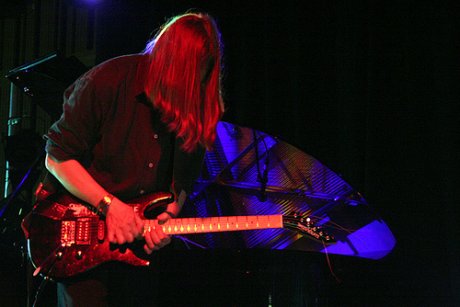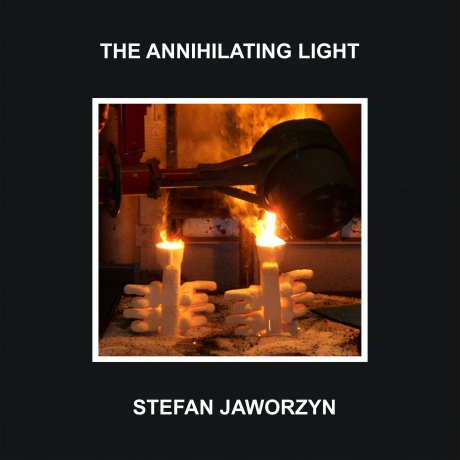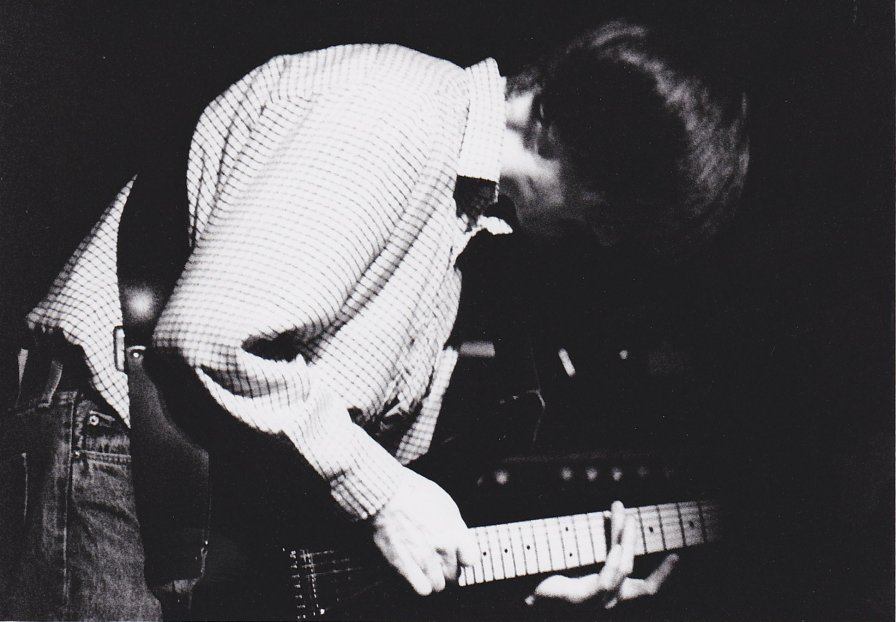Between 1989 and 1996, Stefan Jaworzyn’s Shock label was home to a wildly diverse roster. Divine Horsemen, Current 93, The Dead C, Nurse With Wound, and Skullflower were all on the bill, together with a number of others whom unwittingly stretched the definition of musical categories often applied to their work. As a member of Skullflower between 1986-90, Jaworzyn blurred the boundaries of improvisation, noise, and power electronics amid creative flings with Tony Irving as Ascension (which later became Descension with Simon H. Fell on double bass and Charles Wharf on saxophone) and with William Bennett as a member of Whitehouse on Never Forget Death and Twice Is Not Enough. In addition to his instrumental escapades, he also edited the Shock Xpress zine while finding the time to co-organize the Shock Around the Clock film festival, which rendered him a cultural chieftain in extending the reach of horror, gore, and splatter movies in London.
After a 17-year absence, Jaworzyn has rekindled Shock Records by dropping two solo 12-inches (EP1 and EP2) and a full-length (Eaten Away By Shadows) on the back of Kino, a four-disc discovery of previously unreleased, reissued, and remastered Skullflower material. To make this resurgence a little more potent, Jaworzyn’s next solo album, The Annihilating Light, will be released February 12 on Graham Lambkin’s Kye label. And on January 27, Blackest Ever Black is slated to release Drained of Connotation, a collection of home recordings from 1982 that provide a particularly twisted perspective on Jaworzyn’s back catalog.
TMT shot Jaworzyn over questions with hopes of finding out more about his experiences in Cardiff — the city where Drained of Connotation was initially laid down to tape — as well as his life and work in London, the resurgence of Shock, and his forthcoming solo material.
Did you find the lack of UK government funding for public arts projects in the 80s helped or hindered artists working outside of the mainstream? How did that play into your work as a musician?
I’ve never considered myself a ‘musician’!
But it didn’t affect me or anyone I knew. I wasn’t active in areas where funding might have been involved. I did work at a hospital up North for a couple of years in the very early 1980s, and there I saw Tory cutbacks and general twattery at work firsthand; it was not pleasant. Fascistic ‘administrators’ brought in to cut budgets at every level, make it difficult for unions to protect their members and do their work efficiently, producing an atmosphere of tension and ill-feeling. People losing jobs, vacant positions not being filled, the local job centre closing, and a needle exchange opening — that was the direct effect of Tory policies. Experiencing that perhaps served to make me less sympathetic to whining that a grant for 10,000 rolls of film to document The Colonic Wart Growth Project had been refused…
I guess ‘they’ say that intolerant or regressive governments fuel some level of creativity — it’s perhaps true in recent-ish times with rave culture, which blossomed under the Tories — but you only need look at the fate of Pussy Riot to see how a genuinely oppressive regime behaves toward ‘artists’… If the worst you have to complain about is being underfunded by the Arts Council, you aren’t actually having your creativity stifled.
How important was London as a creative environment in your work with Skullflower, and how did that differ from a city like Cardiff?
Cardiff was a toilet. It was run-down, incredibly cheap to exist, lots of unemployed; pretty messed up generally. Oddly enough a guy set up a sort of ‘new romantic’ club and was also curious about ‘underground’ music. We got a couple of gigs from him! (God knows how he ended up in Cardiff.) I guess he perceived us as intriguing human oddities, maybe thought he could create some sort of sub-cultural scene…? His brother was a poet obsessed with the Futurists. Slightly eccentric, he was supposed to perform with us at some point but I don’t recall it materializing… Probably better to fantasize about such events anyway.
The music I’m making now doesn’t seem the product of maturity or looking out the window at the forest — it seems the product of a batty old man who’s still always pissed off about something.
It was Alex Binnie, who I met in Cardiff and whom was in an early version of Skullflower, who urged me to move to London, so he’s largely to blame for my various activities since 1983.
London just happened to be where we all lived. London is London, there’s always god-knows-how-many ‘scenes,’ like-minded(ish) people around to share ideas with. You can always get something going. In Cardiff I think the scene was maybe half a dozen disaffected nutters. It’s conceivable that London’s ‘urban dissonance’ had an effect on Skullflower. It’s conceivable that wandering around Soho on LSD had some effect on me… However, I’d hazard that the early 1980s power electronics/noise scene was shaped more by the contemporaneous atmosphere in London. That felt much more a product of its environment. I guess we (Skullflower) might have been considered an ‘urban’ sound, but I believe had we convened elsewhere we’d have made the same music.

At The Sage, Gateshead, Arika’s Music Lovers’ Field Companion Festival 2007 (Photo: Bryony McIntyre)
As an artist, how has your opinion of London changed since you were recording with Whitehouse and Skullflower?
It’s age, not art, that changes your perspective on London. (Anyway, I’ve never thought of myself as an artist either.) I hate it here now, and I’m pretty sure it’s because I’m middle-aged and 10,000-times more intolerant. When I was in my twenties I thought London was about the coolest city on earth, now I can’t stand it. But so much has changed in the last 30 years it’s unrealistic to compare it now to ‘the good old days’ — which probably sucked but didn’t seem to because we were young and, uh, enthusiastic. When you’re young you barely notice and care less that you’re living in a shithole with no hot water. Or you haven’t eaten for two days because you spent your money on drugs.
It could be true that the place you live affects how you work. But my state of mind has never been, um, tranquil, so the music I’ve been involved with has generally reflected that, right back to when I started. When I was editing Shock Xpress I was generally frothing with bile about something or other… I haven’t really calmed down much in the last 30 years, just tried harder to avoid interaction with assholes… To me, the music I’m making now doesn’t seem the product of maturity or looking out the window at the forest — it seems the product of a batty old man who’s still always pissed off about something…
Audience response also plays into those psycho-geographical factors. You’ve talked before about people chucking glasses at you on stage — was that something you experienced regularly or in certain cities? What do you think provoked the audience most to do that?
The glass-throwing was only one incident, when Descension supported Sonic Youth in 1996 or 97 at The Forum. It seemed to be felt in some circles that the London SY ‘fans’ were particularly intolerant and thus easily freaked out — in the U.S. SY had been taking free-jazz players on tour or having them as support with no similar incidents. I don’t really know why that Descension ‘riot show’ occurred, but it was a one-off. People still occasionally mention it, I dunno, it seems to have been memorable for those who experienced it — I’ve never forgotten the waves of hostility washing over us, that’s for sure…
When did you first become aware of The Shadow Ring?
I knew Graham [Lambkin] before they formed, or rather we’d been writing to each other — I can’t remember exactly when we got in touch, possibly in Shock Xpress days. He sent me their first 7-inch, I loved it and reviewed it for Music From the Empty Quarter (in a typically meaningless, mentalist style). He did the artwork for my Dead C release… I was reminded recently I ‘gave the bride away’ at their wedding. So it’s over 20 years anyway…

The Annihilating Light LP, due February 12 on Kye
How did you wind up releasing material on Lambkin’s Kye label?
We’d been out of touch for a while. He saw my interview in The Quietus and dropped me a line. At some point in our emails he mentioned that if I had anything, uh, suitable, he’d be interested in releasing it. I had two pieces that were unlike most of the material I’ve been recording, and he liked them. It was surprisingly easy.
What can you tell me about the recording processes behind The Annihilating Light? What were you trying to achieve with that sound?
It’s rare that I set out to achieve anything. Since I started recording again I’ve been approaching it on a slightly more considered basis than, say, the pure improvisation of Ascension or the semi-improvisation of Skullflower. (Talking about influences, ideology, and ‘philosophy’ can make me uncomfortable. When I used to read what musicians actually ‘think,’ it regularly put me off listening to them.) There are certain aspects of music and art I thought might be interesting to consider when constructing certain types of sound. That, however, only applies to one of the two pieces on this album.
